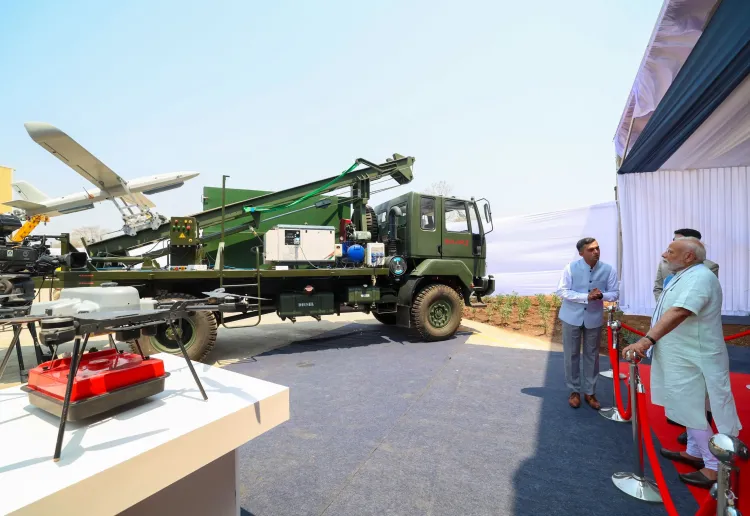PM Modi Launches Solar Defence and Aerospace's Loitering Munition Test Facility

Synopsis
Key Takeaways
- Loitering Munition Test Facility inaugurated by PM Modi.
- Project aims to boost self-reliance in defence.
- Investment of Rs 12,700 crore in Nagpur.
- Focus on drones, UAVs, and explosives.
- Contracts signed to enhance firepower of the Indian Army.
Nagpur, March 30 (NationPress) Prime Minister Narendra Modi officially opened the Loitering Munition Test Facility of Solar Defence and Aerospace Limited, which is providing the Nagastra-1 'suicide drone' and essential components of the Pinaka Multiple Launch Rocket System to the Indian Army, in Nagpur on Sunday.
"I visited the Solar Defence and Aerospace Limited facility in Nagpur and inaugurated the Loitering Munition Test Facility. This development will significantly enhance self-sufficiency in the defence sector," PM Modi stated in a post on X.
Solar Industries India Ltd announced in January that its wholly-owned subsidiary Economic Explosives Limited (EEL) has entered into a memorandum of understanding (MoU) with the Maharashtra government to set up a large-scale defence and aerospace initiative in Nagpur.
"...this is to inform you that in a decisive move towards strengthening the nation's capabilities in crucial sectors like Defence and Aerospace, Economic Explosives Limited (EEL), a wholly owned subsidiary of Solar Industries India Limited has signed a Memorandum of Understanding (MoU) with the Government of Maharashtra, India, on January 22, 2025, in Davos, Switzerland to establish an Anchor Mega Defence and Aerospace Project in Nagpur," it stated in a regulatory filing.
The agreement, formalised during the World Economic Forum in Davos, plans for a project with an estimated investment of around Rs 12,700 crore, focusing on enhancing production capabilities in critical defence products such as drones, unmanned aerial vehicles (UAVs), counter-drone systems, energetic materials, and next-generation explosives.
According to the company, the Maharashtra government will assist with necessary permissions, registrations, approvals, and fiscal incentives for EEL in line with the state’s policies and regulations.
The defence subsidiary of the Solar Group has supplied several advanced weapons to the Indian armed forces.
Last June, the Indian Army received the first batch of 'Nagastra-1' or 'suicide drones' from EEL, which can accurately target enemy training camps and launch pads in border regions, thus safeguarding soldiers’ lives.
The Army has ordered 480 such drones, with at least 120 having already been delivered.
The ‘Nagastra-1’ is a type of “loitering munition”, designed with an in-built warhead to hover until a target is found and then crash into it.
These indigenously developed drones allow for more precise targeting, as the attack can be altered mid-flight or even aborted. In ‘kamikaze mode’, the drone can eliminate any threat with a GPS-enabled precision strike accurate to 2 metres.
Weighing approximately 9 kg, the fixed-wing electric unmanned aerial vehicle (UAV) boasts an endurance of 30 minutes, a man-in-loop range of 15 km, and an autonomous mode range of 30 km.
It can reportedly carry a 1 kg warhead up to a distance of 15 km, and an upgraded version can transport a 2.2 kg warhead up to 30 km.
If a target is not found or if the mission is terminated, these suicide drones can be recalled and make a soft landing using a parachute recovery mechanism, allowing for multiple reuses.
In February this year, the Ministry of Defence (MoD) signed contracts totaling Rs 10,147 crore with EEL, along with Munitions India Ltd (MIL), and Bharat Electronics Ltd (BEL), to bolster the Indian Army's firepower with advanced rockets for the PINAKA Multiple Launch Rocket System (MLRS). This represents a significant advancement in the modernization of India’s artillery forces.
Under these contracts, EEL will deliver the Area Denial Munition (ADM) Type-1 (DPICM), while MIL will provide the High Explosive Pre-Fragmented (HEPF) Mk-1 (Enhanced) rockets.










